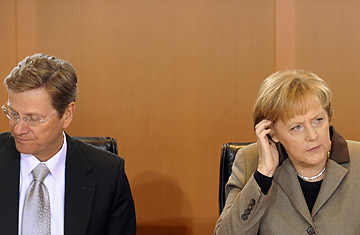
German Chancellor Angela Merkel and German Foreign Minister and Vice Chancellor Guido Westerwelle attend a Cabinet meeting
For German Chancellor Angela Merkel, the new year has gotten off to a dismal start. During the past week, several members of her party, the Christian Democratic Union (CDU), have publicly laid into her laissez-faire leadership style, claiming it has weakened the conservative party's base. And Foreign Minister Guido Westerwelle, leader of the CDU's partner in government, the Free Democratic Party (FDP), has challenged her government's stances on key foreign policy issues, namely German troop levels in Afghanistan and Turkey's long-delayed bid to join the European Union.
Merkel wasn't expecting to encounter so many problems so soon with the governing coalition she negotiated with the pro-business FDP and the CDU's sister party, the Christian Social Union (CSU), following her victory in last September's elections. But holding the coalition together is proving to be a challenge given the policy differences, competing egos and vested interests involved. In an effort to try to iron out the partners' differences, the leaders of all three parties will meet for dinner on Jan. 17 to discuss a host of issues: tax cuts, health care reform, Afghanistan — and the future direction of the government. Merkel is sure to be hoping that a consensus can be reached without the talks devolving into a food fight.
Merkel has been at loggerheads with the FDP over tax reform for months. The FDP has insisted that the government stick to the compromise agreed upon during the coalition talks to introduce additional tax cuts worth $35 billion in 2011. But given Germany's soaring budget deficit, Finance Minister Wolfgang Schäuble, a member of the CDU, is now reportedly looking to postpone the tax cuts until after 2011.
Westerwelle also opened up a can of worms last week by raising the controversial issue of Turkey's E.U. membership bid while on a trip to Ankara. The Foreign Minister voiced support for the country's accession talks — stalled for years by opposition from Germany and France — by saying it was in Germany's interests to forge close links between Turkey and the E.U. The CSU hit back immediately by reiterating its opposition to Turkey's E.U. membership, saying it was ready to offer a "privileged partnership" to Ankara instead. In the past, Merkel has backed a privileged partnership instead of full membership for Turkey, putting a damper on the country's hopes of ever joining the club.
Merkel is also coming under increasing pressure from the U.S. and its NATO allies to outline her position on increasing Germany's troop levels in Afghanistan ahead of an important Afghan conference in London on Jan. 28. Germany has 4,300 soldiers in Afghanistan, making it the third largest international contributor after the U.S. and Britain. But the CDU's partners are split over whether to send more. According to media reports, Westerwelle is opposed to a troop increase and would rather focus on efforts to train the Afghan police. But Merkel's Defense Minister, Karl-Theodor zu Guttenberg, a member of the CSU, is reportedly open to the idea of contributing more troops. "The FDP is the problem child of Chancellor Merkel's new government," author Gerd Langguth, who has written a biography of Merkel, tells TIME. "Merkel isn't an ideologue; she's a pragmatist and a consensus builder. Her challenge is to find a compromise between the coalition parties."
But perhaps even more surprising is the criticism she is receiving from within her own party. On Jan. 10, the Frankfurter Allgemeine Sonntagszeitung newspaper published an open letter signed by four regional CDU parliamentary leaders that said that Merkel owed her electoral victory to luck rather than a convincing campaign strategy and that the CDU had lost touch with its core supporters. The letter also stressed that Merkel's main priority should be to "win back the conservative and economic liberal voters." Analysts say that conservative leaders disliked the CDU's swing to the center of the political spectrum when Merkel led the country in partnership with the Social Democrats from 2005 until September 2009, and want the party to shift back to its traditional Christian roots. The CDU governor of Saarland, Peter Müller, confirmed just as much when he told the Handelsblatt newspaper that there should be a more "pure CDU" now.
The letter prompted a wave of attacks on Merkel's leadership in the German media. The country's biggest-selling tabloid, Bild am Sonntag, ran a headline on its front page reading, "The Men's Rebellion Against Merkel," while the Süddeutsche paper published a commentary saying that the Chancellor had been "apathetic and too lazy to think" during last fall's negotiations to form a new government. Experts say the criticism is not entirely surprising. "Chancellor Merkel has to take this letter seriously as it's struck a chord with thousands of conservative supporters," Langguth says.
All of the tensions have dealt a blow to Merkel's approval ratings. According to a survey by the polling institute Infratest Dimap on Jan. 7, 59% of Germans approve of the way Merkel is doing her job, compared with 70% in December. The Chancellor will have to find a way to rekindle the love that swept her back into power last year, or she could be looking at a very long, torturous 2010.
